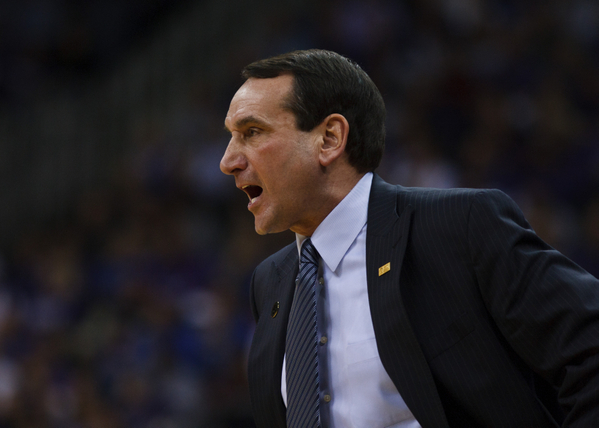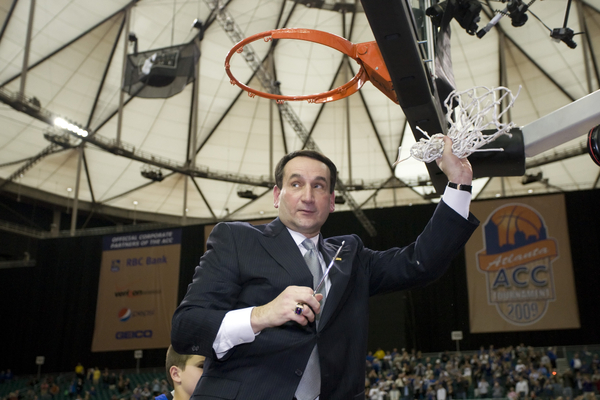20 Questions: Is Coach K the Greatest Coach in NCAA History?
Posted by mpatton on October 31st, 2011Matt Patton is the RTC correspondent for the Atlantic Coast Conference and an ACC microsite staffer.
Question: Coach K will become the all-time winningest coach soon. Is he the greatest coach in NCAA basketball history? If not, where does he rank?
Yes, but with a disclaimer. Mike Krzyzewski is the greatest coach of the modern era. You can define that era in many ways: the expansion of the NCAA Tournament (either when in 1975 it expanded to 32 teams, or when in 1985 it expanded to the truly modern 64 teams); the adoption of the shot clock (1985-86); the addition of the three-point line (nationally in 1986-87); or the advent of ESPN (1979 NCAA Tournament).
Truthfully, the best interpretation is somewhere in between, for all four of these events led to the game we know and love today. The expansion of the Big Dance made the NCAA Tournament more difficult both because more games separated teams from the championship and because at-larges increased the overall talent of the field. The shot clock redefined offenses and frankly made the game more exciting. The three-point field goal introduced statistical “noise” that created large swings in performance and allowed for more upsets (basically, a 40-minute game is a small enough sample size that even a horrendous shooting team like Florida State to go 9-19 from three and a good shooting Notre Dame team to go 7-30 from downtown). Finally, ESPN’s consistent coverage of college basketball symbiotically raised the popularity of both ESPN and men’s hoops.
But to suggest that Coach K is a better coach than John Wooden would be too presumptive. There are plenty of arguments, but no sound logic can definitively put Krzyzewski over the Wizard of Westwood: Wooden won ten national championships in 12 years including an 88-game winning streak that is without a doubt the most dominant stretch of college basketball ever. If you still want to try to argue Coach K over John Wooden, read that one more time. I am not saying that Wooden would see that success now, but it is not like we are dealing with similar resumes. Wooden has as many titles as Coach K, Jim Calhoun, Roy Williams, and Tom Izzo (or Bill Self) combined.
But to get back to the original question, why is Coach K the best coach of the modern era? First here is his resume.
- Four National Championships (1991, 1992, 2001, 2010)
- Eight Championship games (1986, 1990, 1991, 1992, 1994, 1999, 2001, 2010)
- 11 Final Fours (1986, 1988, 1989, 1990, 1991, 1992, 1994, 1999, 2001, 2004, 2010)
- 12 ACC Regular Season Championships (1986, 1991, 1992, 1994, 1997, 1998, 1999, 2000, 2001, 2004, 2006, 2010)
- 13 ACC Tournament Championships (1986, 1988, 1992, 1999, 2000, 2001, 2002, 2003, 2005, 2006, 2009, 2010, 2011)
- 79 career NCAA Tournament victories (most all-time) with a .775 winning percentage (second to only Wooden)
- 900 career victories (only five other coaches have 800 and Bob Knight has 902)
- Gold medals from the 2008 Summer Olympics and 2010 FIBA World Championship
No coach has been as consistently dominant for 25 years. In 15 of those years the Blue Devils topped of the AP poll over a ludicrous total of 104 weeks. In eight of those seasons he has taken home a total of 12 National Coach of the Year honors.
To be sure he is not perfect. You don’t need to look far to find his detractors. With his jet-black hair and sharp face, Coach K rarely slips into a smile, instead always poised to berate the nearest official about a 50/50 call that went the wrong way. Gregg Doyel likened his sideline tirades to “a boxer punching you in the stomach all fight long, knowing eventually in the 12th round when he hits you in the head, you’re going out.” But like Doyel implies, Krzyzewski’s fiery persona serves a purpose beyond irritating opposing fans. It’s an attempt to leverage, fairly or unfairly, the human element.
His career imperfections don’t stop with a grating presence on the court. Many Duke fans actually wanted him gone early in his time in Durham after his teams went 10-17 and 11-17 in his second and third seasons, respectively. The 1982 recruiting class that included Johnny Dawkins, Jay Bilas, David Henderson, Mark Alarie, and Weldon Williams turned things around. Again in the mid-1990s after Grant Hill departed as the final star from the back-to-back National Championships, things looked bleak for the Blue Devils. 1994-95 is the infamous under-.500 season in the middle of K’s decade of dominance, which has now become infamous for the fact that Coach K is only attributed with a 9-3 record as Duke gives the other games (and the grisly 4-15 record) to then-assistant/interim coach Pete Gaudet. While Krzyzewski didn’t coach those games because of back surgery, it was his team with his players, right?. The most recent blight on his record came in the 2000s when Duke’s teams and recruiting classes seemed to constantly fall short of annual expectations, which led many to theorize that myriad road blocks affected his success (i.e., USA Basketball distracting him, lack of energy on the recruiting trail, etc.).
However, the somewhat unlikely Duke championship in 2010 immediately changed the narrative. Suddenly reporters who understandably picked another “alarmingly unathletic” Duke team to be upset in the Sweet Sixteen called the victory over Butler Krzyzewski’s most impressive. Notably, Coach K found a way to make Brian Zoubek a productive college basketball player (it was like Zoubek’s Platonic ideal was an offensive rebounding machine programmed to kick the ball out to the perimeter for a second opportunity). This isn’t meant to take away from Zoubek’s personal growth as a player, but Krzyzewski totally transformed his team dynamic based on what was on his roster. Very few coaches have the flexibility to emphasize their team strengths while hiding weaknesses (the best comparison is Tom Izzo whose recent March successes came largely from making his teams improve throughout the season).
With Krzyzewski still going strong, the only question that remains is when he’ll retire. His teams are still competing at or near the highest level year in and year out, but he will turn 65 years of age this coming February. College basketball coaching is a stressful business. Unlike college football, there are no play callers or coordinators to help things out. Assistant coaches take the brunt of early recruiting, but how many five-star prospects are willing to sign with a team where the head coach is not active in the process? I suspect Krzyzewski will retire within five years, leaving impossibly large shoes for his successor to fill in a program he built from mere relevance to outright dominance.
In the end it is Krzyzewski’s continued success that pushes his resume above his contemporaries. He has made Duke a staple everywhere from the top of the polls to the top of tempo-free statistics. Wooden will forever stand as the nearest point of perfection a coach can attain in college basketball, but with one more Final Four Coach K can match his dozen trips to the final weekend leaving only Wooden’s unmatched (and unmatchable) ten National Championships etched in the record books. But first another record will be broken: the all-time NCAA Division I win total. If Duke is able to get through a tough opener at home against Belmont, Krzyzewski will have a chance to pass his former coach and lifelong mentor Bob Knight on the all-time win list at the Champions Classic against Tom Izzo and Michigan State at Madison Square Garden, the Mecca of Basketball, which seems like the appropriate place to do it.












































